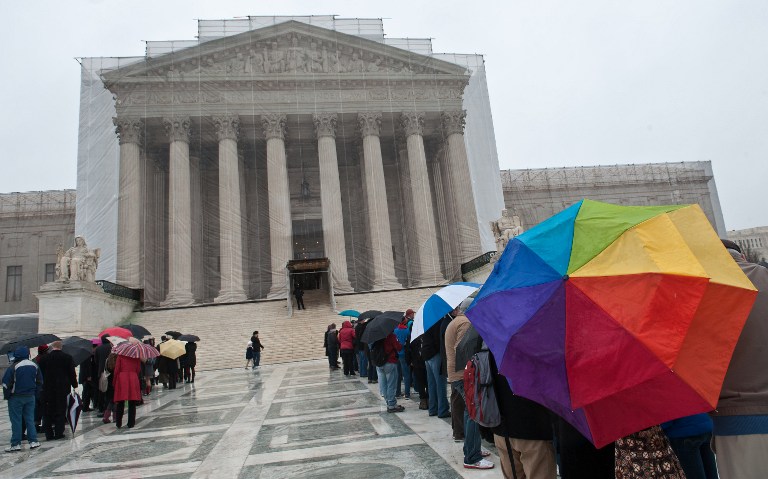SUMMARY
This is AI generated summarization, which may have errors. For context, always refer to the full article.

WASHINGTON DC, USA – Barring an unexpected turn of events, the US Supreme Court is poised to issue a historic ruling on gay marriage this week — but it is unlikely to legalize the practice country-wide.
Traditionally, the highest court in the land hands down decisions before its summer break on cases heard in the preceding months, generally leaving the most momentous for last.
While at the end of June 2012 it was President Barack Obama’s healthcare reform, this season gay marriage is expected to round out the rulings.
Of course, that’s unless the 9 justices — 5 appointed by Republican presidents and 4 by Democrats — have difficulty reaching agreement and decide to revisit the matter in the fall.
With the court shrouded in secrecy, a frenzy is expected when the panel presided over by conservative Justice John Roberts divulges whether the definition of marriage can be extended to include same-sex couples.
In a country where 12 US states plus the capital allow gays and lesbians to marry, the top court is due to take a stance on two appeals and decide whether the principle of equality defended by the constitution has been violated.
In the first case, a gay widow from New York, Edith Windsor, backed by the Obama administration, challenges the federal Defense of Marriage Act (DOMA).
The controversial 1996 law denies married gay and lesbian couples the same federal rights and benefits that heterosexual couples take for granted, from tax breaks and welfare benefits to access to a hospitalized spouse.
The second case deals with the the constitutionality of California’s Proposition 8, a 2008 ballot initiative that saw a majority of voters in the nation’s most populous state ban same-sex marriage.
At its hearing at the end of March, the top court seemed ready to repeal DOMA but reluctant to legalize gay marriage in California.
The court could rule on California alone, on the states that have similar legislation on civil unions, or on those that still ban gay marriage.
“This term, in particular, it’s very risky to bet on what the Supreme Court will do,” said lawyer Elizabeth Wydra, who works for the Constitutional Accountability Center.
As with most of the important cases, Justice Anthony Kennedy, who usually votes with the right, “could be the deciding factor,” she said.
David Cruz, law professor at the University of Southern California, said it was very unlikely that the court would adopt a broad ruling that strikes down all gay marriage bans.
“I think seeing all same-sex couples being able to get married in every state is probably not going to happen immediately … because of the tradition in the court: the Justices often move in steps, they rule incrementally,” he said.
Thomas Keck, political science professor at Syracuse University, said that whatever the justices decide, “it is going to be high-profile and it is going to get lots of attention.”
Fifty-three percent of Americans support gay marriage, according to a recent survey by the Gallup polling institute.
A survey by the Pew Research Center found that 47 percent of nearly 500 gay marriage news stories studied between March 18 through May 12 — a period marked by Supreme Court deliberations — primarily focused on support for the measure.
The high court could also decide that the lawsuits are not admissible due to the judicial incompetence of one of the parties: the anti-gay activists who are defending “Proposition 8,” a group of Republican lawmakers who want to protect traditional marriage through DOMA, or the Obama administration, which, after first defending the law, is calling for it to be overturned. – Rappler.com
Add a comment
How does this make you feel?
There are no comments yet. Add your comment to start the conversation.